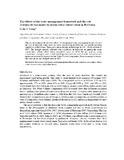Please use this identifier to cite or link to this item:
http://hdl.handle.net/10311/363Full metadata record
| DC Field | Value | Language |
|---|---|---|
| dc.contributor.author | Toteng, E.N. | - |
| dc.date.accessioned | 2009-09-08T13:12:21Z | - |
| dc.date.available | 2009-09-08T13:12:21Z | - |
| dc.date.issued | 2008 | - |
| dc.identifier.citation | Toteng E.N. (2008) The effects of the water management framework and the role of domestic consumers on urban water conservation in Botswana, Water International, volume 33, number 4, pp. 475-487 | en_US |
| dc.identifier.issn | 0250-8060 | - |
| dc.identifier.issn | 1941-1707 | - |
| dc.identifier.uri | http://hdl.handle.net/10311/363 | - |
| dc.description.abstract | This article examines the adverse effects of a fragmented water management framework and the role of domestic water users on water conservation in Gaborone, the rapidly growing capital city of Botswana. There was a major drought in Botswana in 2004, which recurred in 2007. The drought seriously affected water availability in Gaborone, re-igniting the water conservation debate. Most urban households prior to 2004 did not practise water conservation, except in cases of enforced temporary measures, such as water restrictions and increased water tariffs imposed by the Water Utilities Corporation. From secondary evidence, the situation had not changed much in 2007. | en_US |
| dc.language.iso | en | en_US |
| dc.publisher | Routledge http://dx.doi.org/10.1080/02508060802475415 | en_US |
| dc.subject | Botswana | en_US |
| dc.subject | Gaborone | en_US |
| dc.subject | water management framework | en_US |
| dc.subject | domestic consumers | en_US |
| dc.subject | urban water conservation | en_US |
| dc.subject | stakeholder theory | en_US |
| dc.title | The effects of the water management framework and the role of domestic consumers on urban water conservation in Botswana | en_US |
| dc.type | Published Article | en_US |
| Appears in Collections: | Research articles (Dept of Environmental Science) | |
Files in This Item:
| File | Description | Size | Format | |
|---|---|---|---|---|
| Toteng_WI_2008.pdf | 831.73 kB | Adobe PDF |  View/Open |
Items in DSpace are protected by copyright, with all rights reserved, unless otherwise indicated.
